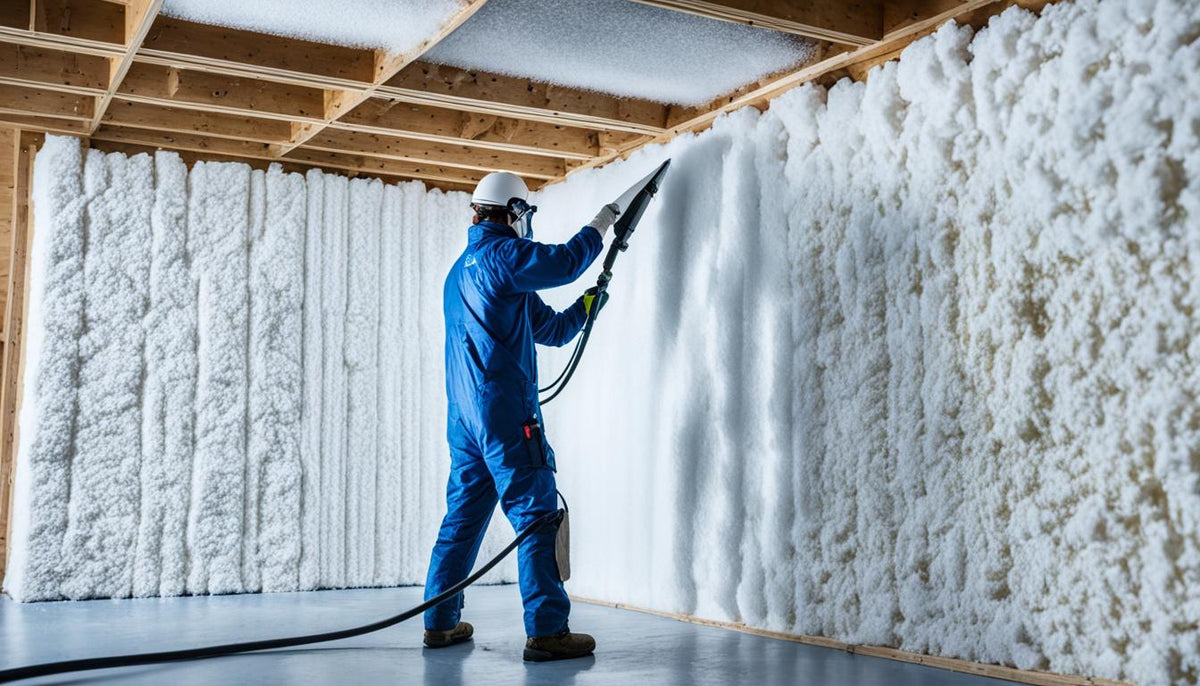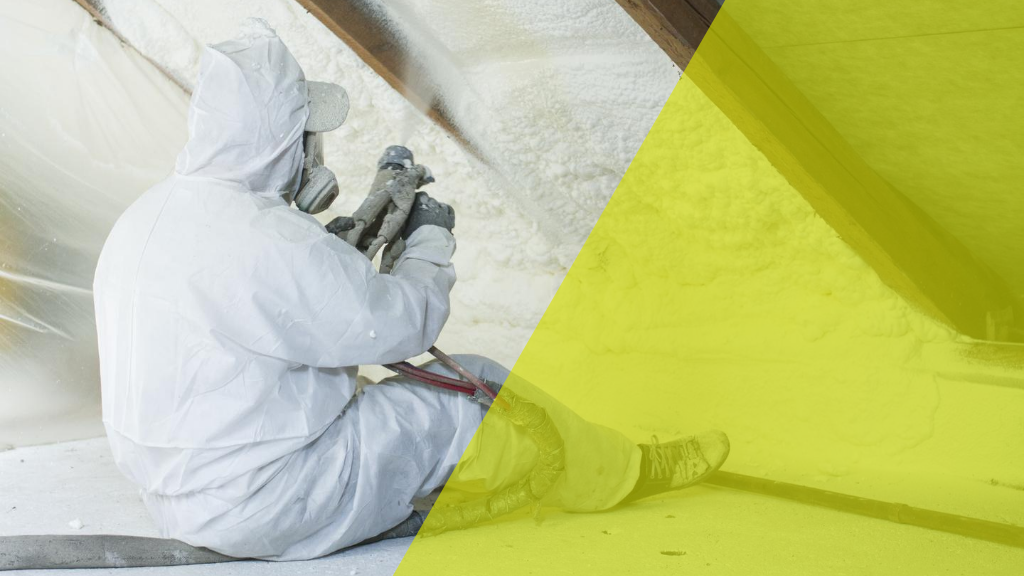Recognizing the Benefits of Using Spray Foam for Insulation Projects
Recognizing the Benefits of Using Spray Foam for Insulation Projects
Blog Article
Spray Foam: The Ultimate Service for Air Sealing and Insulation
Spray foam insulation has arised as a leading service for efficient air sealing and thermal insulation, using a distinct combination of residential or commercial properties that establish it apart from standard techniques. Comprehending the full extent of its advantages, setup procedures, and comparisons with other insulation types is essential for making informed decisions.
What Is Spray Foam?
Spray foam is a flexible insulation material that incorporates the principles of air sealing and thermal resistance to boost energy performance in structures. Composed largely of polyurethane or other comparable substances, spray foam is applied as a fluid that increases upon contact with surface areas, producing a solid, continual layer of insulation. This special home allows it to fill up spaces, fractures, and spaces that typical insulation products may overlook, providing a remarkable air seal.
There are 2 primary sorts of spray foam: open-cell and closed-cell. Open-cell spray foam is lighter and a lot more versatile, supplying excellent noise absorption and a reduced R-value per inch - Spray Foam. On the other hand, closed-cell spray foam is denser, giving a greater R-value, dampness resistance, and included architectural honesty to building parts
The application process generally includes customized devices, making sure a smooth application that abides by various substratums, including concrete, timber, and metal. This adaptability makes spray foam ideal for both new building and constructions and retrofitting existing structures. Its capacity to produce an impermeable barrier substantially contributes to reducing power consumption and enhancing indoor air top quality, thereby making it a favored choice amongst builders and house owners alike.
Advantages of Spray Foam Insulation
Among one of the most considerable benefits of spray foam insulation is its remarkable ability to develop a continuous air barrier, which successfully decreases power loss. Unlike typical insulation materials, spray foam broadens to fill voids and cracks, ensuring that air leakage is dramatically lowered. This particular not just enhances power performance but likewise leads to reduce utility expenses with time.
Furthermore, spray foam insulation gives exceptional thermal resistance, adding to a more secure indoor atmosphere. Its high R-value per inch allows for effective insulation in constrained spaces, making it optimal for attic rooms, walls, and crawl spaces. The moisture-resistant residential or commercial properties of spray foam aid protect against mold and mold growth, advertising healthier living problems.
One more crucial advantage of spray foam insulation is its sound-dampening high qualities (Spray Foam). It properly reduces sound transmission in between areas, creating a quieter and much more comfy home environment. The sturdiness of spray foam additionally sticks out, as it does not sag or resolve over time, maintaining its performance throughout its lifespan
Just How Spray Foam Functions
Understanding just how spray foam insulation functions is important for appreciating its effectiveness in air securing and thermal resistance. Spray foam insulation includes two main components: isocyanate and polyol material. When these parts are combined, they undertake a chemical reaction that triggers the material to increase swiftly, creating a dense foam that loads gaps, splits, and tooth cavities.
As the foam broadens, it follows surface areas, developing a closed seal that considerably minimizes air infiltration. This particular makes spray foam insulation very reliable at avoiding drafts and dampness penetration, which can result in energy loss and damage with time. In addition, the closed-cell version of spray foam supplies premium thermal resistance because of its inflexible structure, effectively minimizing heat transfer.
The distinct buildings of spray foam enable it to satisfy uneven surface areas, making certain thorough protection and a seamless obstacle. Consequently, spray foam insulation not just boosts energy effectiveness yet likewise contributes to improved interior air top quality by reducing the buildup of pollutants and irritants. Eventually, understanding the auto mechanics behind spray foam emphasizes its function dig this as a superior option for insulation and air sealing in both commercial and household applications.
Setup Refine Review

Prior to installation, the space needs to be sufficiently cleaned up and prepped, guaranteeing that surface areas are devoid of dirt, debris, and wetness. This step is vital due to the fact that pollutants can jeopardize bond and general performance. Once the area is prepared, the application entails blending both elements of the spray foam, which expands upon call and loads spaces effectively.
Trained specialists must perform the setup, using specific tools to ensure uniform insurance coverage and optimal density. Safety precautions, consisting of using safety equipment and making sure correct air flow, are important throughout this process. After application, the foam generally cures promptly, developing a solid obstacle that improves energy efficiency.
Contrasting Spray Foam to Conventional Insulation
When examining insulation alternatives, spray foam insulation attracts attention in comparison to traditional products such as fiberglass and cellulose. Among the key advantages of spray foam is its remarkable air securing capabilities. Unlike fiberglass and cellulose, which can allow air seepage, spray foam increases upon application, loading crevices and spaces to develop a closed seal. This results in improved energy efficiency, as much less heated or cooled down air gets away the home, causing reduced energy bills.
Furthermore, spray foam gives a greater R-value per inch than typical insulation kinds, providing more efficient thermal resistance in a thinner profile. This characteristic is particularly advantageous precede with minimal cavity deepness. Spray foam is immune to wetness and mold development, which can be a significant problem with cellulose and fiberglass, specifically in humid environments.
However, spray foam insulation typically carries a higher in advance cost than its standard counterparts. Property owners need to weigh this preliminary investment against long-term energy cost savings and performance benefits. Ultimately, while both insulation types serve their purpose, spray foam arises as an extra advanced option for contemporary insulation demands, particularly in regards to air securing and thermal efficiency.

Final Thought
In summary, spray foam insulation represents an extremely efficient service for attaining optimum air securing and thermal resistance. Its distinct properties, consisting of moisture resistance and Source noise dampening, make it suitable for different applications in both brand-new constructions and retrofitting projects (Spray why not try this out Foam). The initial expenses might be higher contrasted to traditional insulation products, the long-term advantages, such as substantial energy financial savings and enhanced interior air top quality, warrant the investment and emphasize its worth in contemporary structure techniques.
Spray foam insulation has actually emerged as a leading remedy for efficient air securing and thermal insulation, supplying a distinct combination of properties that set it apart from traditional techniques.Spray foam is a functional insulation material that integrates the principles of air sealing and thermal resistance to boost power effectiveness in structures.When examining insulation choices, spray foam insulation stands out in comparison to typical materials such as fiberglass and cellulose. Inevitably, while both insulation kinds offer their objective, spray foam emerges as an extra advanced option for contemporary insulation demands, specifically in terms of air sealing and thermal effectiveness.
In recap, spray foam insulation stands for a very reliable solution for accomplishing optimal air securing and thermal resistance.
Report this page